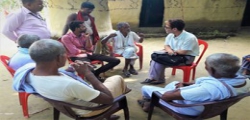Abstract
Context: Palliative care has not developed widely in rural North India. Since 2010, the Emmanuel Hospitals Association (EHA) has been developing a model of palliative care appropriate for this setting, based on teams undertaking home visits with the backup of outpatient and inpatient services. A project to further develop the model operated from 2012 to 2015 supported by funding from the UK.
Aims: This study aims to evaluate the EHA palliative care project.
Settings and Design: Rapid evaluation method using a mixed method realist approach at the five project hospital sites.
Methods: An overview of the project was obtained by analyzing project documents and key informant interviews. Questionnaire data from each hospital were collected, followed by interviews with staff, patients, and relatives and observations of home visits and other activities at each site.
Analysis: Descriptive analysis of quantitative and thematic analysis of qualitative data was undertaken. Each site was measured against the Indian Minimum Standards Tool for Palliative Care (IMSTPC).
Results: Each team followed the EHA model, with local modifications. Services were nurse led with medical support. Eighty percent of patients had cancer. Staff demonstrated good palliative care skills and patients and families appreciated the care. Most essential IMSTPC markers were achieved but morphine licenses were available to only two teams. Remarkable synergy was emerging between palliative care and community health. Hospitals planned to fund palliative care through income from surgical services.
Conclusions: Excellent palliative care appropriate for rural north India is delivered through the EHA model. It could be extended to other similar sites.







